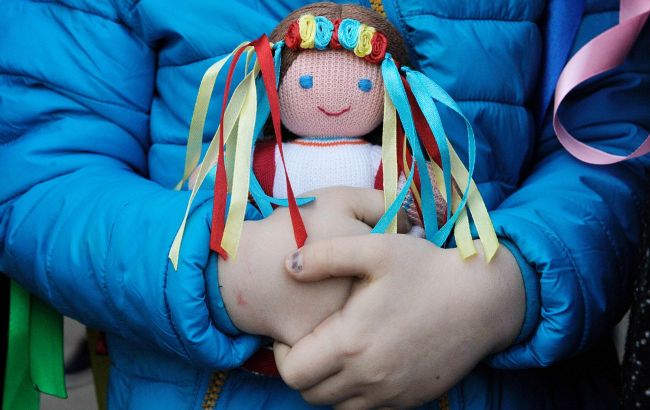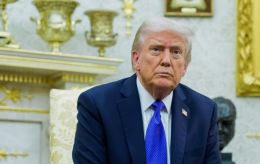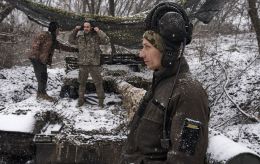Ukrainian children deportation from Kherson orphanage: NYT reveals investigation on Russian crimes
 Photo: deportation of Ukrainian children to Russia (GettyImages)
Photo: deportation of Ukrainian children to Russia (GettyImages)
The New York Times reports that a network of officials and politicians affiliated with Russian leader Vladimir Putin's party has been campaigning to deport Ukrainian children out of Kherson.
At the beginning of the Russian occupation of the city, the staff of the Kherson orphanage managed to move the children to the basement under fire. These children with special needs are infants and children under five years old, some of whom have serious disabilities, such as cerebral palsy.
Later, the pastor of a local church, given the dangerous situation, convinced them to move the children to his church, where he could provide them with heat, light, and food.
Eventually, Russian officials found the children. They transported them nearly 300 kilometers from their home, filming the children for their propaganda videos.
Through social media and propaganda videos, journalists followed the movement of these children and analyzed a number of posts on Russian social media.
According to legal experts, what happened to the children afterward may constitute a war crime.
Children returned to orphanage
The Russian occupation authorities in Kherson (at the time of the city's occupation by the Russian military) demanded that the children be moved back to the orphanage. The management of the institution finally agreed.
According to one of the educators, in the following months, the Russian military frequently and unannounced visited the orphanage to monitor the children and educators.
In the early spring of 2022, the Russian flag was already flying over the building, and armed soldiers and politicians began bringing humanitarian aid to the children, including Russian propaganda literature and sodas.
Over the next few months, Russian officials took photos and videos of themselves helping the children and posted them on their social media.
Putin's footprints
Among those who frequented the institution was Igor Kastyukevich. He was a member of the Russian parliament from Putin's United Russia political party.
In their interviews with The Times, Russian officials repeated the same idea and claimed that the children from Kherson were Russian.
In May 2022, Putin signed a document that simplified the acquisition of Russian citizenship, which means that Russians can more easily adopt Ukrainian children abducted by Russia.
Cooperation with Russian occupiers
Later, the director of the institution, Olena Kornienko, and the educator, Natalia Lukina, refused to cooperate with the Russian occupation authorities, to receive a Russian passport and resigned from the institution because they did not want to participate in what the Russian-appointed officials could do to the children.
Instead, the new head of the institution was Tetiana Zavalska, one of the pediatricians of the institution who did not hide her pro-Russian views. The month of her appointment, the orphanage was registered in the Russian system.
Some experts on Eastern Europe see these actions as a publicized Kremlin campaign to justify Russia's invasion of Ukraine, with Putin playing the role of savior.
Children began to be taken away
Later, the staff of the institution was informed that the children were being taken away. In closed chats on Telegram, volunteer students from medical universities in Crimea were specially recruited for this purpose. The Russian occupation authorities of Crimea, Kherson, and some officials from Moscow came to take the children.
The children were transported to Simferopol, the capital of Crimea, and divided between two children's institutions. The staff of one of them, Yolochka, had previously been accused of improper childcare.
'Officially' abducted
Russian officials claim that the relocation of the children was a humanitarian mission and was in line with their Constitution, as Russia had annexed the Kherson region and the residents of the region were under their control. However, human rights experts say that the laws of a single state cannot take precedence over international obligations.
The Ukrainian side claims that they were not officially informed of the children's whereabouts. However, Russian officials left traces on Telegram.
Eventually, the children were granted Russian citizenship, which is a prerequisite for adoption and placement in Russian families. Legal experts argue that the issuance of new documents, the translation of the children's names, and the change of their citizenship indicate the intention of the Russian authorities to deprive the children of their identity, which is a violation of the Convention on the Rights of the Child. This may also constitute a war crime.
The Times has not received a response to its numerous requests for comment from the administrations of Vladimir Putin and Maria Lvova-Belova. In her public statements, the ombudsman promised to continue her work.
Last August, their interests were represented by the Ministry of Labor and Social Policy of the occupied Kherson region.
Later, photos of Kherson children began to appear in the Russian federal database of orphans among tens of thousands of Russian children. Journalists found 22 children from the Kherson orphanage there. The profiles indicated that the children were from Crimea, but their place of birth, namely Ukraine, was not mentioned.
Children's fate
At least two of the children were placed in Russian families, according to the service for children in Crimea.
At least seven children from the Kherson orphanage returned to Ukraine with the assistance of the Ukrainian authorities and intermediaries from Qatar. Among them are Anastasia and Mykola Volodin, whose mother went to Moscow to pick them up in February this year.
Anastasia later died in a Ukrainian hospital, just weeks after turning six. The doctor called the cause of her death an epileptic seizure.
Mykola is under the care of the Ukrainian state while his parents await a court decision on their parental rights. The rest of the Kherson children are still under Russian control.
Return of Ukrainian children
According to Ukrainian Human Rights Ombudsman Dmytro Lubinets, Russia has illegally deported more than 19,000 Ukrainian children. Returns are difficult, often involving intermediaries.
The International Criminal Court has issued an arrest warrant for Russian President Vladimir Putin in the case of the deportation of Ukrainian children.
On May 23, it became known that Ukraine had returned 13 children from the occupied territories with their families. Later, 6 more Ukrainian children were returned from the occupied part of the Kherson region.

